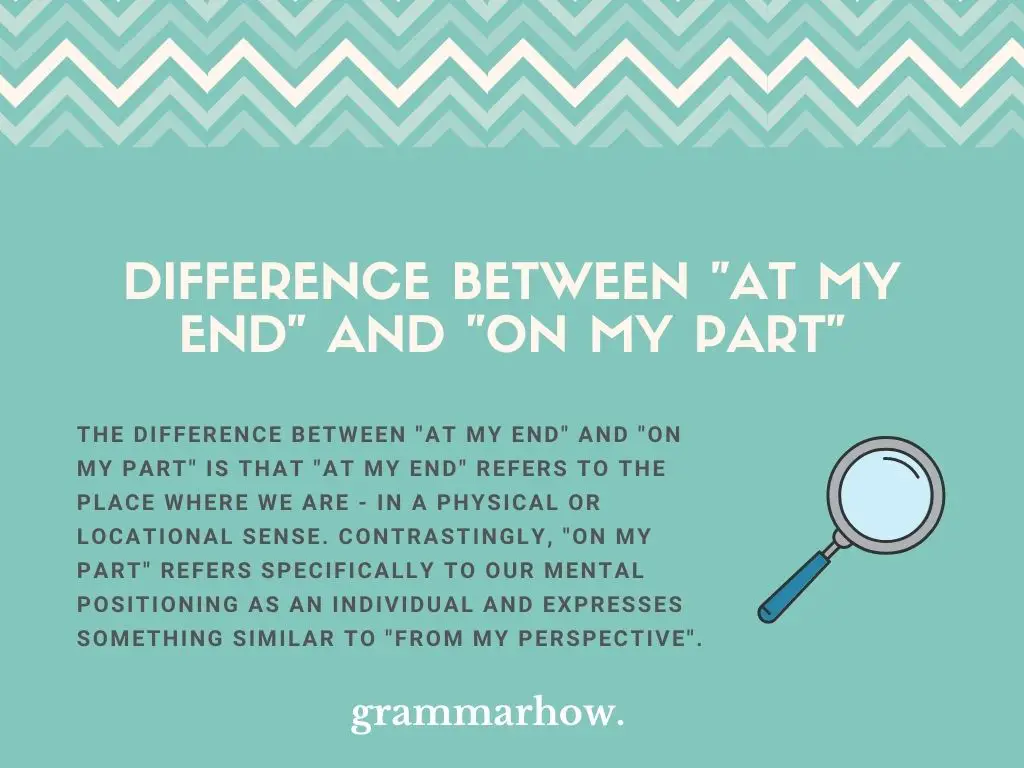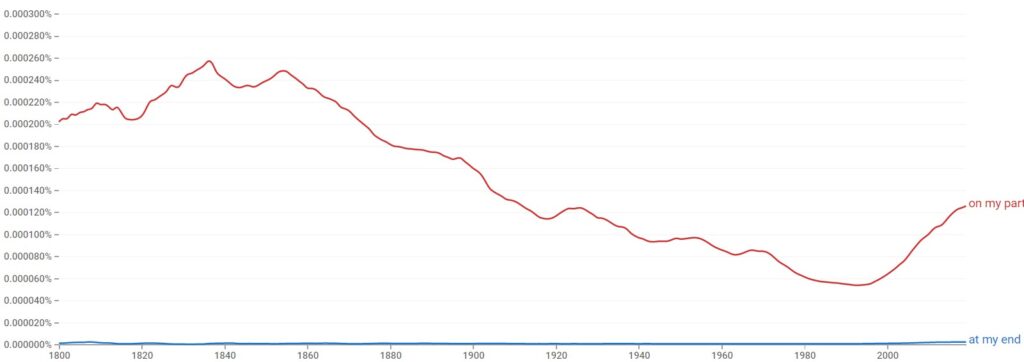The phrases “at my end” and “on my part” are seemingly quite consistent. However, the different prepositions and usage of “end” and “part” can often cause slight confusion. Therefore, we will be taking an in-depth look at both phrases, their correct use, and their meanings.
What Is The Difference Between “At My End” And “On My Part”?
The difference between “at my end” and “on my part” is that “at my end” refers to the place where we are – in a physical or locational sense. Contrastingly, “on my part” refers specifically to our mental positioning as an individual and expresses something similar to “from my perspective”.

Therefore, we can remember the difference in use by equating “at my end” to a physical position or a similar phrase like “from where I am”. On the other hand, “on my part” can be thought of as our mental position or standpoint, similar to the phrase “in my opinion”.
It’s also worth noting that the phrase “on my part” is oftentimes thought of as being a tad more formal than “at my end”.
What Does “At My End” Mean?
Generally, “at my end” is considered to imply a physical space or a geographical location of some sort. This is similar to saying “over here” or “from the place where I am”. We’ll typically hear or see this phrase used when we are distanced from someone while communicating with them.
This can mean that we are communicating with someone by phone, email, text message, or even from office to office. Typically, we would not use this phrase in an in-person conversation, as we are in the same location.
It’s important to note that we will often see “at my end” used when we are discussing the difference between something occurring for us, with something that the person we are speaking to is experiencing – like connectivity issues, internet troubles, etc.
We will now go over some examples that highlight the correct use of this phrase in a sentence:
- The internet connection is still down at my end.
- Everything seems to be functioning fine at my end.
- I’m still having ongoing issues at my end of things.
- He’s at my end of the building, which I’m not fond of.
- Unfortunately, at my end, technical errors are abundant.
- The connection is very poor at my end, I apologize!
- I could truly use your help at my end.
- I apologize for the muffled audio at my end, my mic isn’t working properly.
- I believe I have covered all of the bases at my end.
- The email service is down at my end, which is very inconvenient.
What Does “On My Part” Mean?
Typically, “on my part” is considered to imply our mental positioning or our overall and current thought process. This is very similar to saying “from my perspective” or “from my understanding”. We may utilize this phrase when we are having a distanced conversation or an in-person conversation.
This means that we are able to use this phrase when chatting with someone over the phone, by email, or by text message – similarly to “at my end”. However, we may also use this phrase when we are in person, as it has to do with our thoughts and opinions, as opposed to our physical location.
We can also use “on my part” to discuss our involvement in something, as this is something we have been a part of. Consistently, we can use “on my part” to discuss an action that we have personally completed.
We can now look over the following various examples that showcase the appropriate use of this phrase in a sentence:
- That was certainly a large error on my part.
- This may be incredibly selfish on my part, but may I leave early today?
- There was no hesitation on my part.
- There was an abundance of arguing, but not on my part.
- I know, I know, it was absolutely ridiculous on my part.
- There is a tendency for slight weirdness and quirkiness on my part.
- There were actually a series of mistakes on my part.
- There was quite a bit of disagreement and pushback on my part.
- It was a case of very poor judgment on my part.
- On my part, I have a preference for working from home.
Are “At My End” And “On My Part” Interchangeable?
We should not use “at my end” and “on my part” interchangeably. While these phrases are similar, “at my end” is generally used to discuss our specific location at the time of a conversation or issue. Meanwhile, “on my part” typically discusses our opinion or our involvement in something.
Is “At My End” Or “On My Part” Used The Most?
When looking at the data provided by Google Ngram Viewer, we are able to see that the phrase “on my part” has always been used more commonly than “at my end”. In fact, we are able to see that the use of “at my end” is nearly non-existent.

“At my end” may have no use due to the fact that many folks will say “on my end” instead. Other people may merely be using “on my part” in place of “on my end” mistakenly.
In terms of “on my part”, this phrase has generally been popular in use, regardless of the time period. However, from approximately 1850 until the late 1990s/early 2000s, this phrase saw a continuous decline in use. The phrase has only started to become more common in use again over the last two decades.
“At My End” And “On My Part” – Synonyms
We will now look over some examples of synonyms for both of the phrases “at my end” and “on my part”. These synonyms should be considered as alternatives, that can easily be substituted in place of our two original phrases.
“At My End” Synonyms
- On my end.
- From my end.
- From my location.
- From over here.
- From where I’m standing.
“On My Part” Synonyms
- In my opinion.
- From my point of view.
- From my perspective.
- As far as I’m concerned.
- As far as I can tell.
You may also like: On Your End – Meaning & Preposition Guide (Helpful Examples)

Martin holds a Master’s degree in Finance and International Business. He has six years of experience in professional communication with clients, executives, and colleagues. Furthermore, he has teaching experience from Aarhus University. Martin has been featured as an expert in communication and teaching on Forbes and Shopify. Read more about Martin here.
